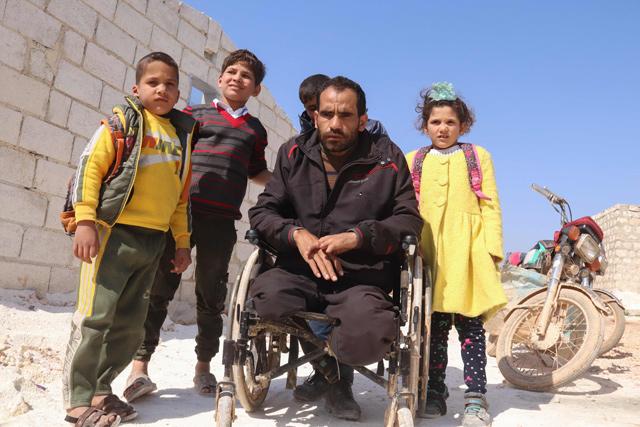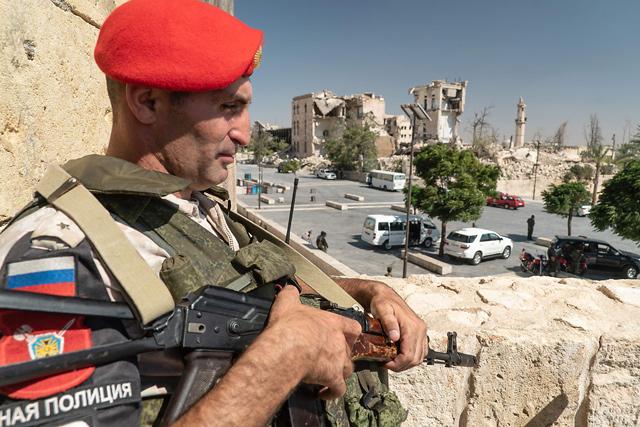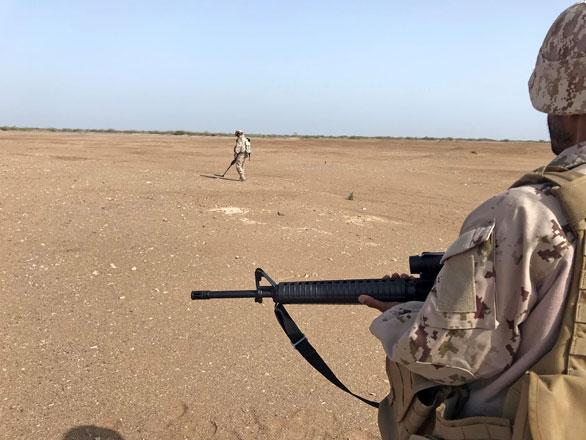You are here
Tracing wounded body, one Syrian charts course of war
By AFP - Mar 12,2020 - Last updated at Mar 12,2020

Syrian Ibrahim Al Ali poses for a photo on his wheelchair surrounded by his children, at the Deir Hassan camp for the displaced in Idlib's northern countryside near the Turkish border, on March 7 (AFP photo)
DEIR HASSAN, Syria — First he lost three fingers, later his hearing in one ear. Then all at once, both his legs and eyes. Ibrahim al-Ali was wounded every time he tried to escape Syria's war.
In a camp for the displaced near the Turkish border, the 33-year-old father of four shows the scars he has sustained in a conflict now entering its tenth year.
His eyes sealed shut, he runs his fingers along a long lesion below his chest, cuts on his arm, as well as discoloured scars on his scalp, neck and waist.
Leaning forward on the edge of a thin mattress, the former blacksmith gently exercises one of his amputated legs, cut off just below the knee.
Ali did not always look like this. In an image on his smartphone, he appears as a dapper young man dressed in dark blue tracksuit and holding a baby girl.
But violence in Syria’s last major rebel pocket has pursued him everywhere for years, robbing him of what he enjoyed most in life.
“I can’t carry my children anymore,” he says, slim arms clad in a stripey brown pullover and resting on his thighs.
“I can’t work, or even move.”
Ali and his family are among nearly one million people who have been displaced in northwestern Syria since December by a Russia-backed regime offensive.
For hundreds of thousands like him, it was just the latest of multiple displacements in recent years.
Map of conflict
Ali’s body is like a map of his miraculous but horrific journey through the increasing violence in northwestern Syria.
Inside a small breeze-block house, he swipes his hand slowly over the floor to find his cup of coffee, brings it to his lips, and tells his story.
He was first wounded in 2013, right after he fled his native village of Shaizar in Hama province due to heightened hostilities.
In the nearby town of Latamneh, Ali was hit by regime barrel bombs, pieces of shrapnel piercing his wrist and arms.
That same year, he and his family fled further north to the town Maaret Hurma in Idlib province, where regime shelling pummelled their house, and severed three fingers on his left hand.
In early 2014, he relocated to the village of Kafr Sajna, also in Idlib, where shrapnel from an air strike punctured his chest and broke parts of his ribcage.
After three years of seemingly endless wounds, in 2016 Ali moved to farmlands outside the town of Khan Sheikhun.
“I almost survived the entire year without an injury,” he says.
But in its very last month, another attack wounded his head and right ear, robbing him of his hearing on that side.
He uprooted his family yet again, heading back north to Sheikh Mustafa, where they would remain safe for a whole 12 months.
Syria’s war has killed more than 390,000 people since it started in 2011.
‘The worst yet’
In mid-2018, however, Ali would suffer his worst injuries yet.
On his way back home from work, he stepped on a landmine that blew off his legs and ravaged his eyes.
“That was the last day I saw the world,” he says.
Today, Ali hauls himself onto a wheelchair, and his younger brother pushes him outside into the sun, clutching a smiling young boy riding along on his lap.
After the landmine, Ali spent one month in a coma in neighbouring Turkey.
“I woke up unable to see anything,” he says.
“The world was pitch black.”
When he returned to Syria, the war showed no sign of letting up.
“We had to keep escaping,” Ali says.
Eventually, he moved into his brother’s modest home in the displacement camp, where he and his family now reside.
A ceasefire has halted fighting since last weekend, but Ali describes his current circumstances as “the worst yet”.
“In the camps, we don’t have a home or even basic amenities,” he says.
As the war grinds on, Ibrahim will probably have to leave again, although it is unclear where to.
One thing, however, is certain for the young man twice arrested during the uprising for protesting against President Bashar Assad’s regime.
“If I were to be cut open and if my neck was to be sliced off and my head severed, I wouldn’t accept for me or my children to live under Assad’s rule.”
Related Articles
RASTAN, Syria —In regime-held central Syria, Suleiman Berber carried his son in his arms, anxiously observing Russian soldiers unload food p
Al Masri family, now reunited in exile this week by the horrors of Syria’s war, have watched their country unravel with breathtaking brutality.
AL MOKHA, Yemen — Yasser Yassin was driving along a road on Yemen's rugged Red Sea coast when a blast sent his Toyota Hilux flying into the



















